

Selecting the best large breed dog food for your sizable pup is an important decision not to be made spontaneously or under the influence of marketing ploys. But why do large breeds require specific nutrition, and how can you choose the right food for your dog?
While there's no silver bullet formula that's right for every dog, understanding why large breeds need food tailored to their size can help you establish healthy feeding habits to help them thrive.
Why Do Large Breed Dogs Need Special Food?
If you have an adult dog who weighs 55-plus pounds or a puppy who's anticipated to reach that weight in adulthood, they have unique nutritional needs. Large breed dogs — including Bernese mountain dogs, Great Danes,German shepherds, Newfoundlands, Labrador retrievers and bullmastiffs, to name a few — have lots of growing to do! This growth rate is critical, and it needs to be safely controlled. A large breed puppy who puts on weight too quickly or receives an imbalanced amount of minerals is at risk of irreversible bone damage and orthopedic disease.
Large breed dogs are more prone to certain health concerns compared to small breed dogs. While small dogs aren't immune to orthopedic disease, degenerative joint disease, such as dog hip dysplasia, is far more common in large and giant dogs. This is why large breed often require formulated nutritious dog food ingredients that promote joint health and decrease inflammation, like omega-3 fatty acids and glucosamine.

What Nutrition Does a Large Breed Puppy Need?
If you've ever loved a large breed puppy, you know just how special they are. Like their adult counterparts, large breed puppies have special nutritional needs to match. For instance, did you know hip dysplasia begins during puppyhood? While genetics play a role in your pup's likelihood of developing hip dysplasia, nutrition does, too.
Feeding your puppy a formula that's too calorically dense puts them at higher risk of developing this lifelong disease. So, choosing an appropriately balanced formula is critical to establishing health and wellness for years to come. Talk to your vet about the best large breed puppy food for your dog's lifestyle, size and overall health.
Health Conditions Associated With Large Breeds
Wondering what makes large breed puppy food different? Large breed puppy foods are formulated to be less concentrated in calories than regular or small breed puppy foods while maintaining nutritional value. This prevents dangerous, rapid growth and helps reduce the risk of diseases they're prone to due to their size, such as:
Hip and elbow dysplasia
Joint and ligament laxity
Hyperextended joints
Soft or deformed bones (e.g., rickets, osteomalacia)
Joint disorders (e.g., osteochondrosis dissecans)
Bone disease or inflammation (e.g., panosteitis)
Can a Large Breed Dog Eat Small Breed Food?
Don't feed a large breed dog — adult or puppy — a small breed dog food. While a single meal won't harm them, feeding your dog a complete, balanced and size-appropriate food is the foundation of lifelong health.
What Are Some Key Factors in Feeding Large and Giant Breed Puppies?
Here are some tips for selecting the best large breed dog food and establishing healthy eating patterns for your puppy.

Choose a Large Breed-Specific Formula
Believe it or not, overnourishment is one of the biggest concerns for large breed puppies. Sticking with a food formulated for large breeds can help you avoid an overly energy-dense food, specifically in terms of calories and fat.
Avoid Supplementation
Vitamin and mineral supplements may sound great in theory, but they can harm your puppy's health. Large breed puppies require a specific balance of minerals. For example, too much calcium or an improper ratio of calcium to phosphorus can leave large breed puppies at risk for developmental joint diseases, such as osteochondrosis dissecans.
Say No to Free Feeding
Free-choice feeding — leaving a bowl out for your dog to eat at will — is linked to overnutrition and unhealthily rapid growth during critical periods in young dogs. It's also a risk factor for obesity, which poses health risks for dogs of all ages. Your veterinarian can help fine-tune how much and how often your pup or adult dog should eat. Dogs do best with a consistent feeding routine, so choose a schedule that's easy to stick to.
Make Food Changes Gradually
Sometimes you find a formula you and your veterinarian are pleased with, but your dog has other ideas. Luckily, you have many flavors and protein sources to choose from. Remember, however, that changing your dog's food suddenly can cause stomach upset, such as vomiting or diarrhea. So, transition your dog to a new food slowly, gradually increasing the ratio of new to old food over a week.
Taking a Well-Rounded Approach to Your Dog's Health
Without proper nutrition, large breed puppies can be at risk for various health concerns, including developmental orthopedic diseases, endocrine disorders and obesity. While the old adage "food is medicine" isn't exactly true, nutrition remains a cornerstone of health in veterinary medicine. But even though all large breeds benefit from large breed dog food, there's no one-size-fits-all approach to canine nutrition. Talk to your veterinarian about the best large breed dog food for your dog until you find a formula that's vet and pup approved.




















